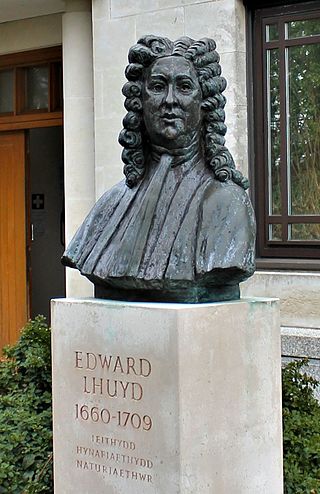
Wales is a country that is part of the United Kingdom. It is bordered by the Irish Sea to the north and west, England to the east, the Bristol Channel to the south, and the Celtic Sea to the south-west. As of 2021, it had a population of 3.2 million. It has a total area of 21,218 square kilometres (8,192 sq mi) and over 2,700 kilometres (1,680 mi) of coastline. It is largely mountainous with its higher peaks in the north and central areas, including Snowdon, its highest summit. The country lies within the north temperate zone and has a changeable, maritime climate. Its capital and largest city is Cardiff.

The University of Wales is a confederal university based in Cardiff, Wales. Founded by royal charter in 1893 as a federal university with three constituent colleges – Aberystwyth, Bangor and Cardiff – the university was the first university established in Wales, one of the four countries in the United Kingdom. The university was, prior to the break up of the federation, the second largest university in the UK.

Cardiff University is a public research university in Cardiff, Wales. It was established in 1883 as the University College of South Wales and Monmouthshire and became a founding college of the University of Wales in 1893. It was renamed University College, Cardiff in 1972 and merged with the University of Wales Institute of Science and Technology in 1988 to become University of Wales College, Cardiff and then University of Wales, Cardiff in 1996. In 1997 it received degree-awarding powers, but held them in abeyance. It adopted the operating name of Cardiff University in 1999; this became its legal name in 2005, when it became an independent university awarding its own degrees.

Cynog Glyndwr Dafis is a Welsh politician and member of Plaid Cymru who served as the Member of Parliament for Ceredigion from 1992 to 2000, originally as a joint Plaid Cymru–Green Party MP until 1997 and then only as a Plaid Cymru MP until 2000. He also served as the Member of the Welsh Assembly for Mid and West Wales from 1999 to 2003. Born Cynog Glyndwr Davies at Treboeth in Swansea, Glamorganshire, Wales, he was initially a school teacher and researcher before entering politics.

Edward Lhuyd, also known as Edward Lhwyd and by other spellings, was a Welsh naturalist, botanist, herbalist, alchemist, scientist, linguist, geographer, and antiquary. He was the second Keeper of the University of Oxford's Ashmolean Museum, and published the first catalogue of fossils, the Lithophylacii Britannici Ichnographia.

The National Library of Wales, in Aberystwyth, is the national legal deposit library of Wales and is one of the Welsh Government sponsored bodies. It is the biggest library in Wales, holding over 6.5 million books and periodicals, and the largest collections of archives, portraits, maps, and photographic images in Wales. The Library is also home to the national collection of Welsh manuscripts, the National Screen and Sound Archive of Wales, and the most comprehensive collection of paintings and topographical prints in Wales. As the primary research library and archive in Wales and one of the largest research libraries in the United Kingdom, the National Library is a member of Research Libraries UK (RLUK) and the Consortium of European Research Libraries (CERL).
Sue Jones-Davies is a Welsh actress, singer and local politician. She played Judith Iscariot in the film Monty Python's Life of Brian (1979) and was Mayor of Aberystwyth from 2008 to 2009.

Sir Thomas Herbert Parry-Williams was a Welsh poet, author and academic.
Archives Wales is a web resource that allows cross-searching of Welsh archive collections. It was founded in 1995 as Archives Council Wales and was renamed to Archives and Records Council Wales (ARCW) in 2004. The archives are described at collection level only, although the ultimate intention is to allow for searching at item level. In July 2009, after a major refurbishment funded by CyMAL: Museums Archives and Libraries Wales, it was relaunched as Archives Wales, or Archifau Cymru in the Welsh language. The URL is Archives.Wales or archifau.cymru

Aberystwyth is a university and seaside town and a community in Ceredigion, Wales. It is the largest town in Ceredigion and 16 miles (26 km) from Aberaeron, the county's other administrative centre. In 2021, the population of the town was 14,640.
Brynley Francis Roberts, known as Bryn Roberts, was a Welsh scholar and critic, who wrote significantly on the Welsh language and Celtic history. He was Professor of Welsh Language and Literature at the University of Wales, Swansea 1978–1985 and Librarian of the National Library of Wales in 1985–1994, then made editor of the Dictionary of Welsh Biography in 1987 and of Y Traethodydd in 1999. He was on the council of the Honourable Society of Cymmrodorion and involved in the Morfa Chapel, Aberystwyth, part of the Presbyterian Church of Wales. In 2011, he was elected as a Fellow of the Learned Society of Wales.

The University of Wales Trinity Saint David is a multi-campus university with three main campuses in South West Wales, in Carmarthen, Lampeter and Swansea, a fourth campus in London, England, and learning centres in Cardiff, Wales, and Birmingham, England.
John Thomas Koch is an American academic, historian, and linguist who specializes in Celtic studies, especially prehistory, and the early Middle Ages. He is the editor of the five-volume Celtic Culture: A Historical Encyclopedia. He is perhaps best known as the leading proponent of the Celtic from the West hypothesis.

Autism Cymru was Wales' national charity for autism with offices in Cardiff, Wrexham, and Aberystwyth. The charity was established in May 2001 through an initial 3-year grant provided by The Shirley Foundation. The founder chair of the Trustees was Dame Stephanie Shirley of the Shirley Foundation.

Thomas Hughes Jones was a Welsh poet and writer from Ceredigion (Cardiganshire) in West Wales. He wrote several collections of stories and contributed to various journals, including Welsh Outlook, throughout his career. In 1940 he won the Literature Medal for his story, "Sgweier Hafila", at the National Eisteddfod. His pen name was generally abbreviated to "T. Hughes Jones".

Lorna M. Hughes has been Professor in Digital Humanities at the University of Glasgow since 2015. From 2016 to 2019, she oversaw the redevelopment of the Information Studies subject area The re-launch was marked by an international symposium at the University of Glasgow in 2017.
John Glyn Davies was a Welsh scholar, poet and songwriter, most of whose creative writing is in the Welsh language. His songs for children, often in the form of sea shanties, remain very popular in Wales. He was also the first librarian of the institution which eventually became the National Library of Wales. He has been described as "one of the most remarkable figures of his age".
Rhiannon Ifans, FLSW is a Welsh academic specialising in English, Medieval and Welsh literature. She was an Anthony Dyson Fellow at the Centre for Advanced Welsh and Celtic Studies, in University of Wales Trinity St. David. She twice won a Tir na-n-Og prize for her work and won the literary medal competition at the Welsh Eisteddfod, for her 2019 debut novel, Ingrid, which was chosen for the Welsh Literature Exchange Bookshelf. In 2020, Ifans was elected as a Fellow of the Learned Society of Wales.

Welsh devolution is the transfer of legislative powers for self-governance to Wales by the Parliament of the United Kingdom. The current system of devolution began following the enactment of the Government of Wales Act 1998, with the responsibility of various devolved powers granted to the Welsh Government rather than being the responsibility of the Government of the United Kingdom.















